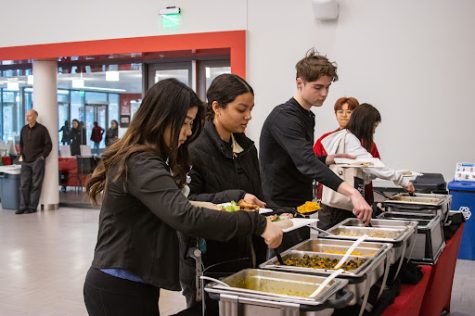Dining Services hosts diet forum

January 22, 2014
Dining services at EWU hosted a Special Diets Forum on Oct. 1 that was open for students to express their special dietary needs, including allergies, intolerances and illnesses.
Dave McKay, director of EWU Dining Services, said the main goal of hosting these forums is to create an atmosphere for students to speak openly to the staff of dining services about their dietary needs.
“Our goal is to bring the students with the special needs or special diet requests and let them meet and have a face-to-face with the managers from different locations, so that way they can develop that comfort [to converse with them],” said McKay.
According to EWU Dining Services’ allergy statement, a food allergy affects the immune system. A protein within a food, known as the allergen, triggers a reaction from the immune system. This causes the body to try and protect itself from the allergen by producing antibodies. These antibodies cause the body to release chemicals, thus causing an allergic reaction.
A food allergy is different from food intolerance, as said on the allergy statement. Food intolerance does not involve the immune system. Rather, it is a metabolic disorder. A natural substance in foods, known as histamine, can cause a reaction similar to an allergic reaction, yet not as severe. Lactose intolerance is the most popular, affecting 1 in 10 people, according to the statement.
Dining services recognizes the eight most common allergens, which McKay referred to during the forum as the “Big 8”: dairy, eggs, peanuts, tree nuts, fish, shellfish, wheat and soy.
One of EWU Dining Services’ biggest concerns is the growing number of students being diagnosed with celiac disease, according to McKay.
Celiac disease is an illness that causes people to become severely ill if they digest gluten, which is a “protein that occurs naturally in wheat, rye, barley and crossbreeds of these grains,” according to the FDA. It occurs “when the body’s natural defense system reacts to gluten by attacking the lining of the small intestine. Without a healthy intestinal lining, the body cannot absorb the nutrients it needs,” as stated on the FDA website. Gluten is found in bread, cakes and dough.
There is no cure for the disease, according to Andrea Levario, executive director of the American Celiac Disease Alliance. The only way to manage the disease is through dietary measures.
During the presentation, McKay said dining services is really focusing on gluten intolerance.
“We are spending a lot of time on celiac [disease] and gluten right now. It’s one of the focuses because recent studies say that by the year 2020, 9 percent of the population will have some celiac intolerance, or gluten intolerance,” said McKay. “Celiac disease is probably the biggest factor in our population that we try and deal with. For society, that’s based on flour. It’s a severe impact to change your dining styles when this comes on.”
McKay claims that dining services offer a variety of gluten-free options at different food locations on campus, such as gluten-free bread, pasta, pizza dough, chicken strips, soy sauce and cereal, just to name a few.
Dining services enjoy receiving recipes from students, according to McKay.
“We got recipes from students over the last couple of years that we are now using. … We got a new recipe for gluten-free pancakes that’s really just amazing that one of our students brought to us. … [It was] a good exchange,” said McKay.
As for students who are lactose intolerant, or have trouble digesting dairy products, EWU Dining Services has many lactose-free items available, such as almond and soy milk.
Barbara McAfee, manager of Swoop’s and Baldy’s, claims that the labeling system they use at these dining locations specify if what they are serving contains any of the Big 8 allergens in it, as well as gluten or soy. She insists students never be hesitant to ask any of the staff members about the food they make.
In a recent statement released by McKay, he said that dining services is eliminating all use of peanuts and tree nuts in their bakeries and kitchens. This decision was made to reduce the risk of cross contamination and to lower the risk of a student, staff member or guest of the university from getting an allergic reaction.
McKay encourages students to know and understand what causes their allergic reactions or intolerance and avoid it. Yet, he says, he understands it is not as simple as it sounds.
“[When] you’re dining out every day as you would on campus, you’re walking up to a prepared item or ordering something. You don’t see the kitchen; you don’t see how it was handled,” said McKay. “You need to have a certain amount of faith in what we’re delivering to you is delivered in a clean and pure [manner], avoiding cross contamination. That’s where we rely on our customers, the people with these conditions, to identify themselves, and let us know what they need.”
Dining services takes every precaution to ensure that their health codes and ServSafe training is up to date among their staff to avoid cross contamination.
“Ninety five percent of our professional staff, our classified staff… is ServSafe certified. Everybody goes out and gets their health department license. … They have to take a course and they have to pass a fairly strict test,” said McKay. “It’s not a cake walk. You have to pay attention.”
Ashley Raney, a freshman at Eastern, attended the forum. She was recently diagnosed with celiac disease and wanted to know what her eating options were on campus.
She thought the open discussion with the staff of EWU’s Dining Services was very helpful.
“It seems like everyone here has been so helpful. Everyone wants to be able work with my intolerance and be able to help us eat like everyone else with normal eating habits. It’s really helpful,” said Raney.
EWU Dining Services can be contacted at 120 Tawanka Hall or via phone at (509) 359-2540.
Courtesy to Jaime Williams for recording the forum.






![Simmons said the biggest reasons for her success this year were “God, hard work, and trusting [her] coach and what she has planned.”](https://theeasterner.org/wp-content/uploads/2024/05/image1-1-1200x800.jpg)









